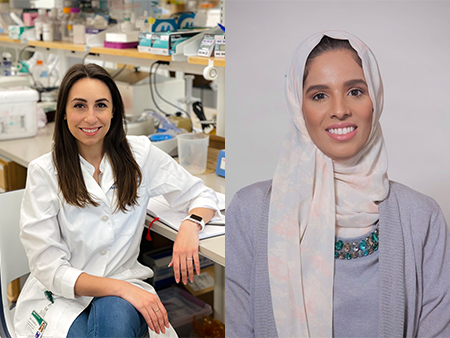 Part of the mission of the Civitan International Research Center is to foster the next generation of scientists studying brain development.
Part of the mission of the Civitan International Research Center is to foster the next generation of scientists studying brain development.
(Photo by: Steve Wood)Two researchers at the University of Alabama at Birmingham have been named Civitan Emerging Scholars for 2021-2022. The Emerging Scholar Award, presented by the Civitan International Research Center, provides research funding for clinical or basic science research aimed at enhancing the current understanding of brain development, including fields such as autism spectrum disorders, Down and Rett syndromes, developmental disabilities, impaired cognitive development, and the effects of environmental toxins on the development of the brain.
Rudhab Bahabry was selected for her research on the ketogenic diet. Ketogenic diet therapy reduces chronic seizures. Bahabry’s study will seek to determine why the ketogenic diet has positive therapeutic effects on epilepsy. She will also try to identify key molecular targets to better understand the effectiveness of the diet. She will initiate a preclinical study to determine the effects of ketogenic diet therapy on a key epigenetic mechanism and candidate biomarkers that may be linked to the therapy.
Bahabry received her Bachelor of Medicine degree from King Abdulaziz University in Jeddah, Saudi Arabia, and is currently pursuing a Ph.D. at UAB in the lab of Farah Lubin, Ph.D.
 Andrea L. Reid, Ph.D., post-doctoral researcher, Division of Pediatric Neurology and Rudhab Bahabry, Ph.D. candidate, Dept. of NeurobiologyAndrea L. Reid, Ph.D., was selected for her postdoctoral studies of the dysregulation of the circadian rhythms of Duchenne muscular dystrophy patients. The hypothesis is that loss of dystrophin in the brain leads to significant chronodisruption that negatively affects DMD pathological outcomes, thus representing a novel pathological factor in this disease. Her work could provide new understanding of the etiology of DMD and shift the perspective from muscle-centric dystrophin therapies to include brain targeting approaches to address all pathologies.
Andrea L. Reid, Ph.D., post-doctoral researcher, Division of Pediatric Neurology and Rudhab Bahabry, Ph.D. candidate, Dept. of NeurobiologyAndrea L. Reid, Ph.D., was selected for her postdoctoral studies of the dysregulation of the circadian rhythms of Duchenne muscular dystrophy patients. The hypothesis is that loss of dystrophin in the brain leads to significant chronodisruption that negatively affects DMD pathological outcomes, thus representing a novel pathological factor in this disease. Her work could provide new understanding of the etiology of DMD and shift the perspective from muscle-centric dystrophin therapies to include brain targeting approaches to address all pathologies.
Reid received her Ph.D. from the University of Toronto in Ontario, Canada, and is a postdoctoral researcher in the lab of Matthew Alexander, Ph.D. She is an active member of the Research Civitan Club and serves as president.
The $25,000 awards may be used as stipend supplements or for direct projects costs. Recipients will be honored at the Civitan International Board Reception planned for Oct. 14, 2021, in the Civitan International Research Center atrium.